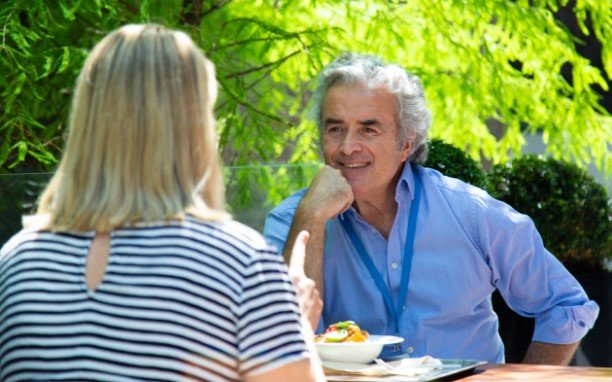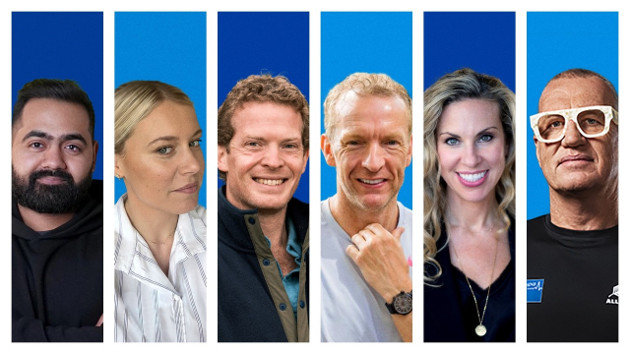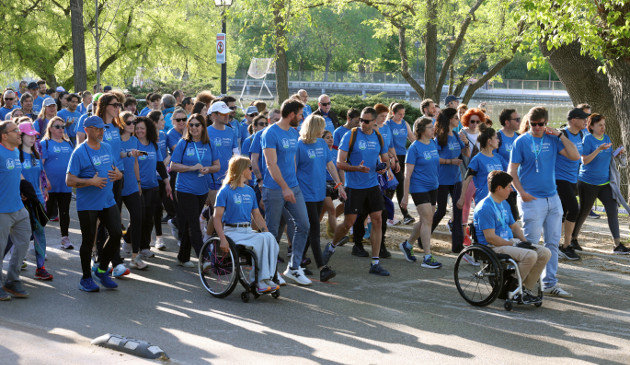
By Dr Julie Smith
Clinical psychologist, best-selling author and social influencer
Courage is an essential human attribute. Choosing the potential for uncertainty over comfort is key to driving change in business and life. Here clinical psychologist Dr Julie Smith talks to Bupa's Group CEO Iñaki Ereño about how to encourage bravery at work.
Bravery is fundamental to wellbeing. Life’s challenges don't ever magically get easier, but if we make conscious decisions to act in ways that give us purpose and resilience, we can fend off negative feelings that might otherwise threaten to overwhelm us. The workplace is no different – it is impossible to achieve anything new and worthwhile without first using courage. And that sometimes means being prepared to accept failure.
For this piece, I spoke to Bupa's Group CEO Iñaki Ereño about bravery. It's one of Bupa’s core values, and Iñaki sees it as an important life skill to nurture in his employees and through company culture. Between us, we aim to help you see that showing courage in the workplace is something we can all aspire to – and achieve.
Iñaki has been Bupa Group’s CEO since 1 January 2021, but he has been at Bupa since 2005. He has held a number of leadership roles including CEO of Sanitas, Bupa's business in Spain, and CEO of Europe and Latin America. Before joining Bupa Iñaki held senior positions at Telefonica Group and Carrefour as well as founding his own online start-up.
What is bravery?
For me, there are two big misconceptions about bravery. One is to confuse it with heroism or daredevilry (dragon slaying or jumping over buses on a motorbike, say). The other is to think that bravery is a personality trait – in other words, to believe that you're either born with it or you're not. Such beliefs are bound to stop you from exploring your courageous side, which exists – whether you think so or not – and is waiting to be developed.
Stanford University psychologist Carol Dweck organises people into two mindsets: Those with a “Growth” mindset and those with a “Fixed” mindset. People with a Growth mindset don't necessarily think anyone can be an Einstein, but they believe everyone can get smarter if they work at it. Those with a fixed mindset believe their talents are constrained by innate ability. Most importantly, Dweck believes mindsets can be changed.
Bravery is not defined by a single act accomplished in one fell swoop. It's more a composite of making hundreds of small choices every day – and it's contagious. Are you brave enough to be the first person to clap when the orchestra finishes playing? Maybe not, but once that first audience member has the courage to overcome any awkwardness, an arena full of people will be inspired to join in.
As Iñaki explains to me, “Being brave is not something to be scared of – it's just normal practice today. We each need to consciously reduce our own fear of acting with courage.”
So back in the arena, is he always the first to clap? “I believe very much in leading by example. So, when we talk about being brave in a business sense, I believe that Bupa has to show the way.”
He cites the company's eco-Disruptive programme as an example. It was launched with the promise of reaching out to more than a thousand eco start-ups in order to seek partnerships that could help tackle sustainability challenges around the world. It was an ambitious task to say the least, and there is little doubt that such an endeavour required a lot of courage to get it off the ground. “Three years ago, people thought I was crazy,” Iñaki chuckles. He certainly proved any doubters wrong. The project is currently in its third successful edition.
Why is bravery so key to wellness?
The key to wellness is not to avoid all risks and stay comfortable at all costs. Contrary to popular belief, aiming for a constant state of comfort can counter-intuitively be the path to mental health problems. This is because humans need to balance predictability and safety with a sense of adventure and getting out of our comfort zone if we are truly to thrive.
For Iñaki, courage is something to be sought in a business context too. Not only does it help to drive Bupa forward, but it helps to unearth people who can enact serious, necessary change. “We want to face big challenges. We want to find apostles of change and get them on our teams. Change is absolutely needed in our industry and in the world.”
Embracing change can be fun
Part of Iñaki’s drive to encourage bravery within Bupa lies in making the fear of failure seem less daunting through cultural change. “The critical thing,” he says, “is to lower expectations when talking about being brave. You're not trying to build a cathedral on day one. It's more about driving iterative change, and to do this, it's important to make being brave part of our shared culture. And it also helps if it's fun!”
Iñaki describes what he calls ‘dinner syndrome’. “You're invited to dinner at someone's house. There are two scenarios. One: they're super organised, the food is there, places set, everything is ready. Two: you arrive to encounter mild chaos and the host invites you to the kitchen to help prepare the dinner. You have a glass of wine and a chat as things come together for the meal.
“The second scenario tends to be better. You have good conversations and you don't want to rush off home.”
Iñaki believes that when it comes to driving change in a business, the second scenario is preferable to the first. In his experience, the people who prefer the second scenario are ready to see opportunity rather than discomfort in ambiguity. They are ready to embrace the fluidity of change. And it is this Growth mindset that will end up driving Bupa – and indeed other businesses – to greater things.
Being brave, going big and keeping going
Mankind's shared enthusiasm for small acts of bravery leading to greater happiness and better outcomes have been proven by Bupa already. The examples abound. When Iñaki was running Sanitas, Bupa's business in Spain, the company was able to transcend the gloom of the financial crisis by offering health cover and new jobs during a time of record unemployment in the country. In addition, he initiated a plan to expand the company's estate of dental clinics business in a time of economic hardship. The dental business now has over 200 clinics bringing Sanitas' total number of patients and customers to 2 million across the country.
More recently, in 2021, Bupa pledged to deliver between 150 and 250 customer experience improvements per business unit in 2022 – a total target of 4,200 against which the company delivered 6,077. Hundreds of individuals were behind each of these projects, each demonstrating individual and collective acts of bravery to try new approaches.
Iñaki also shares his experience of the business world, which is changing in a way likely to reward those who are brave in their everyday lives. “The world is changing,” he notes. “The old approach to a business challenge was to start small and grow from there. The problem is that these small teams may not be able to surmount setbacks – and there will be setbacks. If you start with a big commitment and big intentions I think you are more likely to succeed. Of course, you still need to be prepared to review and potentially stop a project if you think it's not going to be successful, and that can take bravery too.
“We want to be the most customer centric healthcare company in the world. Not just as good as the others. Better. That will take bravery.”
Making bravery a way of life at Bupa and beyond
Humans need a balance between comfort and uncertainty. It's natural and psychologically beneficial to experience both, with neither one tipping the scales. In business, facing challenges, accepting that they come with a level of discomfort and then overcoming them is essential to a healthy workplace.
The key thing to realise is that you can’t just sit around waiting for courage to arrive. It takes a conscious decision to move out of your comfort zone in the interests of securing future wins rather than being content to live in the unthreatening comfort of the moment. Iñaki recommends “working more efficiently, celebrating change and listening to customers” as ways to embrace bravery in businesses like Bupa, and indeed, as a way to keep life more interesting.
To make change happen, as he says, means being brave in bite-sized chunks. If the cathedral needs to be built, you will not be expected to do it alone. Just contribute your own courage and enthusiasm to the task.
More about Dr Julie

Dr Julie is a clinical psychologist, best-selling author and social sensation. After running her own private practice for almost a decade, Dr Julie began sharing her digestible, informative videos on TikTok in 2019. Her often-viral videos cover a variety of mental health topics from anxiety and depression to confidence. Dr Julie has now amassed an audience of over six million and is the go-to online resource for mental health tips and tricks. Her debut book, Why Has Nobody Told Me This Before? was the bestselling non-fiction book of 2022. Dr Julie features regularly on This Morning and BBC Radio 1 Life Hacks.



